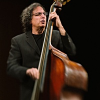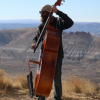Home » Jazz Musicians » Jimmy Blanton
Jimmy Blanton
In his short tenure with Duke Ellington, Jimmy Blanton became the first great double bass virtuoso in jazz. Blanton had both the technique and the fine tone to take this style of playing to higher levels. Blanton took the bass, which had previously been used only to keep time and lay down a basic harmonic foundation, to a new dimension where it became an instrument capable of horn-like solos. Blanton truly turned the musical world onto the possibilities of using the bass as a melodic instrument, both bowed and plucked. His uniqueness lay not only in what he played, but how he played. His influence on generations of bassists has been monumental. James "Jimmy" Blanton was born in Chattanooga, Tennessee in October of 1918. His mother, a pianist who led her own band, started Jimmy on the violin during childhood. While studying at Tennessee State College, he switched to the string bass and started playing with the State Collegians and local bands led by "Bugs" Roberts and drummer Joe Smith. During his summer vacations Blanton played on the riverboat circuit with pianist Fates Marable's band, the Cotton Pickers. After his third year of college, Blanton packed up and moved to St. Louis. In 1937 he joined the Jeter-Pillars Orchestra, playing a three-string bass. He continued to play with Fates Marable in the summer months, and at this time began to hone the skills that would be bring him fame later on. In autumn 1939, the twenty-one year old Blanton started playing on a regular basis at the Coronado Hotel Ballroom in St. Louis. According to Miles Davis, Blanton sat in one night with Davis during his stint with the Blue Devils, the house band at the Rhumboogie Club. It was on this night that Duke Ellington, in town for a concert, stopped by and impressed by the abilities of the young musician, signed Blanton immediately. Blanton shared the bass duties in Duke’s band with Billy Taylor until Taylor left the Ellington orchestra in January 1940. Jimmy Blanton immediately changed the sound and pulse of the orchestra. He had a fluent, buoyant sense of swing, matched with a unique sense of intonation. It was his quality of levitating the sound by his superior musicianship which inspired the other members of the band to rise to the occasion. In his solos, he varied from the usual walking bass lines, and was innovative and inventive in his approach to ensemble playing as well.
Read moreTags
Birth of the Bass: Blanton Inspired a Line of Successors

by Dirk Sutro
Listen Jimmy Blanton brought jazz bass into the modern era in 1940 with his Ellington recordings including “Pitter Panther Patter" and “Jack the Bear," proving that the big instrument could move through the music like a sleek animal. In the decades that followed, dozens more jazz bassists picked up Blanton's innovative vibe, from beboppers like Tommy Potter to bassist/composer Charles Mingus and more recent master improvisers such as Scott LaFaro and Mark Dresser. But the music speaks ...
Continue ReadingRemembering Jimmy Blanton

by Scott Pollard
The saga of Duke Ellington's orchestra is an epic that lasted from the 1920s to the 1970s and has spanned the history of jazz itself. It is not only the story of a man and his music, but of the musicians that he wrote for and that interpreted his songs. Ellington prided himself on knowing his musicians' individual sounds so well that he could tailor each composition to the specific musical identity of each his sidemen. So to say that ...
Continue ReadingJazz Musician of the Day: Jimmy Blanton

Source:
Michael Ricci
All About Jazz is celebrating Jimmy Blanton's birthday today! In his short tenure with Duke Ellington, Jimmy Blanton became the first great double bass virtuoso in jazz. Blanton had both the technique and the fine tone to take this style of playing to higher levels. Blanton took the bass, which had previously been used only to keep time and lay down a basic harmonic foundation, to a new dimension where it became an instrument capable of horn-like solos... Read more. ...
read more
Jazz Musician of the Day: Jimmy Blanton

Source:
Michael Ricci
All About Jazz is celebrating Jimmy Blanton's birthday today! In his short tenure with Duke Ellington, Jimmy Blanton became the first great double bass virtuoso in jazz. Blanton had both the technique and the fine tone to take this style of playing to higher levels. Blanton took the bass, which had previously been used only to keep time and lay down a basic harmonic foundation, to a new dimension where it became an instrument capable of horn-like solos... Read more. ...
read more
Jazz Musician of the Day: Jimmy Blanton

Source:
Michael Ricci
All About Jazz is celebrating Jimmy Blanton's birthday today!
In his short tenure with Duke Ellington, Jimmy Blanton became the first great double bass virtuoso in jazz. Blanton had both the technique and the fine tone to take this style of playing to higher levels. Blanton took the bass, which had previously been used only to keep time and lay down a basic harmonic foundation, to a new dimension where it became an instrument capable of horn-like solos... Read more. ...
read more
Jazz Musician of the Day: Jimmy Blanton

Source:
All About Jazz is celebrating Jimmy Blanton's birthday today!
In his short tenure with Duke Ellington, Jimmy Blanton became the first great double bass virtuoso in jazz. Blanton had both the technique and the fine tone to take this style of playing to higher levels. Blanton took the bass, which had previously been used only to keep time and lay down a basic harmonic foundation, to a new dimension where it became an instrument capable of horn-like solos...In his short ...
read more
Happy Birthday, Jimmy Blanton!

Source:
Riffs on Jazz by John Anderson
Bassist Jimmy Blanton was born in Chattanooga, Tennessee, on this date in 1918. He was the first great innovative jazz double bassist, known mainly for his recordings with Duke Ellington from 1939 to 1941. Before Blanton, the bass was used primarily to lay down the beat and provide the harmonic underpinnings for a tune. Blanton played his bass as a harmonic instrument, using both plucking and bowing techniques to create what have been described as “horn-like" solos. Ellington provided plenty ...
read more
Jazz Musician of the Day: Jimmy Blanton

Source:
All About Jazz is celebrating Jimmy Blanton's birthday today!
Jimmy Blanton
In his short tenure with Duke Ellington, Jimmy Blanton became the first great double bass virtuoso in jazz. Blanton had both the technique and the fine tone to take this style of playing to higher levels. Blanton took the bass... more
Website | Photos | Articles
Follow Jimmy Blanton
Put AAJ's Musician of the Day box on your website or blog ...
read more







































